Story Highlights
- An online survey was carried out to collect data about the kind of vitriol women face day in and day out on Indian social media
- The general feeling is that online platforms fall short of expectations when it comes to stopping and redressing abuse
- The survey has resulted in Feminism in India starting a campaign to curb online violence against women under the hashtag #DigitalHifazat
It’s not news to anyone that women all over the world, including in India, face unprecedented levels of abuse and harassment online, especially on forums like Twitter. We say ‘unprecedented’, because much of this abuse comes from people who use the anonymity provided by the internet to target women in a way that they would perhaps not attempt in real life. Twitter can be an especially abusive space for women because it allows people to create fake profiles and respond to anyone whose views they oppose until they are blocked.
The Indian feminist website Feminism in India (FII) is running a campaign on cyber violence against women following the results of a survey conducted in collaboration with Freedom House, an independent global human rights watchdog.
Feminism in India is running a campaign on cyber violence against women following the results of a survey it conducted with Freedom House
It’s possibly the first time that an attempt has been made to collect data about the kind of vitriol faced by women day in and day out on Indian social media, how it makes them feel, what kind of content posted by them is most often targeted, and how they can counter this.
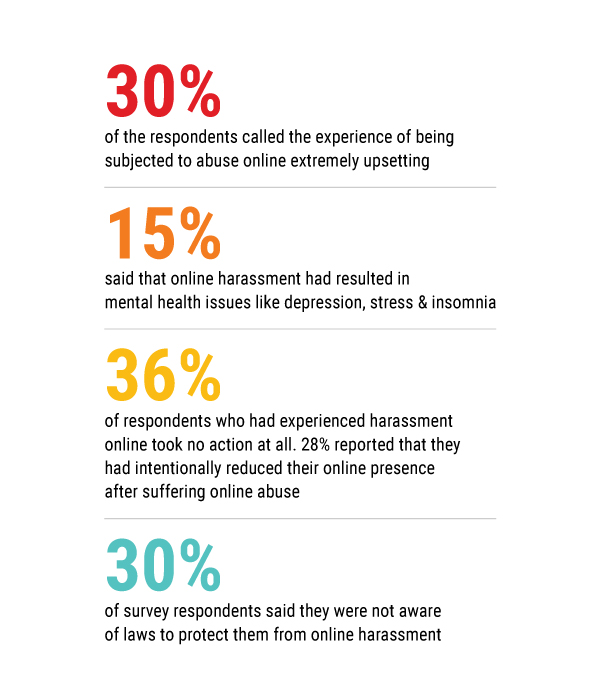
The survey, which has been crafted using responses from 500 women and in-depth interviews with many of them, shows clearly that for the majority of women, online violence is a fact; 57% of respondents said “yes” when they were asked “Have you faced online violence?” While 61% of the women polled said that the violence most often took the form of “abuse and hate speech,” 56.2% said they had faced derogatory comments about their gender (the numbers won’t tally up to 100 because many respondents had faced more than one kind of abuse). The majority of survey respondents were women under 35, living in major cities, and educated to college level or above.
The top topics that incite trolls to target women include writing about feminism, government and politics, and religion.
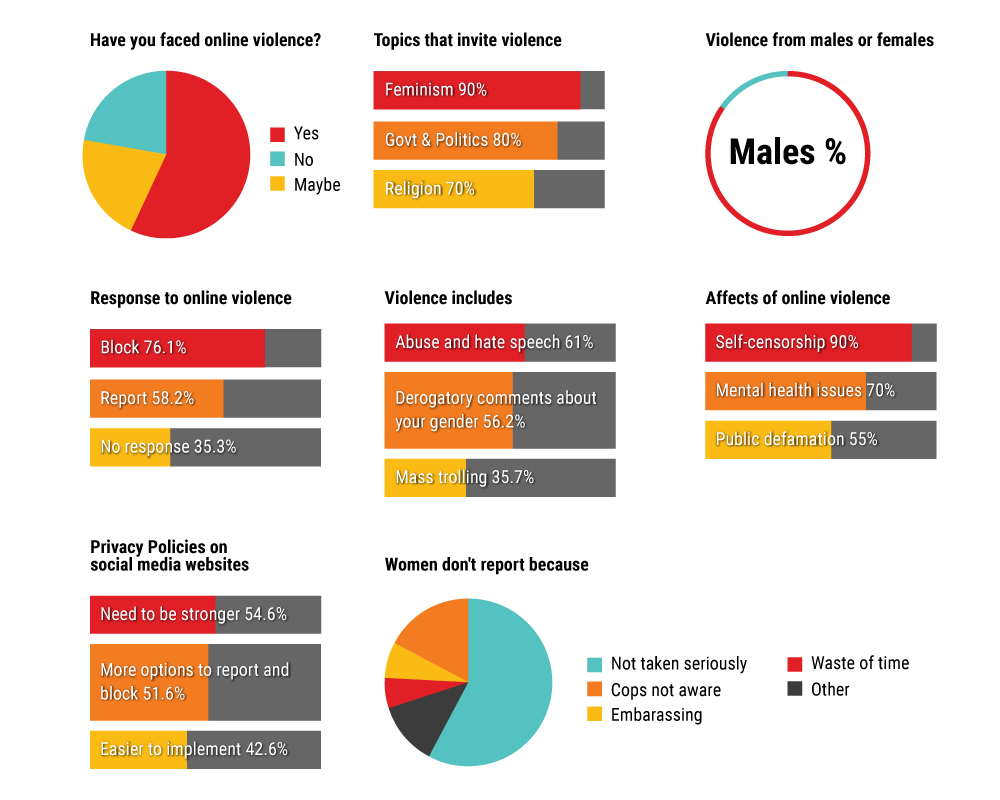
Japleen Pasricha, founder-editor of Feminism in India (FII), points out that the abuse is often not just restricted to invectives on social media and planned mass trolling; it takes even more violent forms. This is the reason the FII refers to such incidents as ‘violence’ instead of ‘abuse’ or ‘harassment’. “We used the term violence because in the report we covered more than just trolling on social media. We also cover violent acts like revenge porn and doxing (publishing private or identifying information about a particular individual, typically with malicious intent). Also, we call this ‘violence’ because often it has adverse effects on women’s mental health and emotional well-being, and leads to depression and self-censorship,” says Pasricha. Authorities advise women to refrain from using their real names or posting pictures of themselves, silencing the victims rather than their abusers, she adds.
The survey has resulted in FII starting a campaign to curb online violence against women using the hashtag #DigitalHifazat, which aims to explore how gender-based violence online affects the participation of women and marginalises genders and sexualities in online spaces.
Some of the responses to the campaign on twitter:
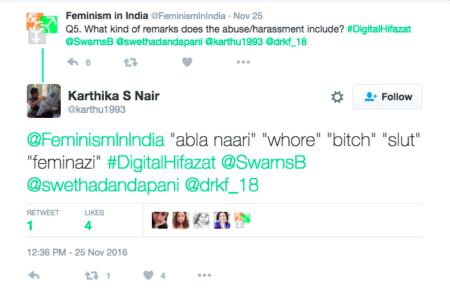
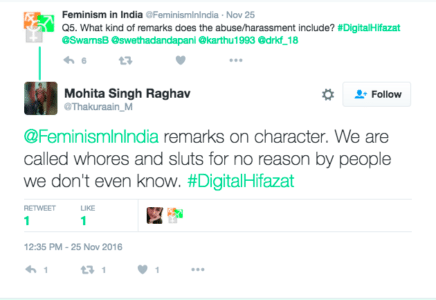
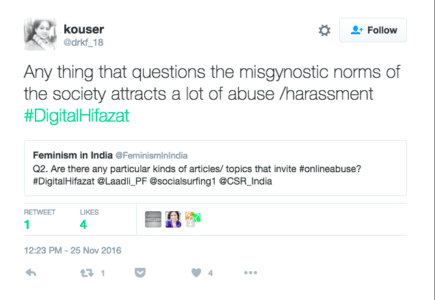
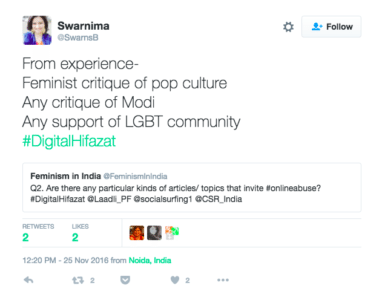
While Pasricha does not classify sexist WhatsApp forwards (which we wrote about here) as violence, she does feel that these social media interactions also reveal the inherent biases in Indian society. “Sexist jokes reflect our mentality and what we take pleasure in, i.e. depicting women in a certain way. It can be disturbing in subtle ways, where a woman in a group is not comfortable with the jokes, but has to laugh anyway to be cool, to be with the peers and most importantly not to be ‘nagging’ and make an issue out of it because that will just then prove ‘their point’,” says Pasricha.
The survey has resulted in FII starting a campaign against online violence using the hashtag #DigitalHifazat, which aims to explore how gender-based violence online marginalises genders and sexualities in online spaces
FII Has also done some research on how individuals can report cybercrimes in India, both to the online platforms on which they have faced verbal violence as well as to the police. The general feeling is that online platforms fall short of expectations when it comes to stopping and redressing abuse. More than 54% of the respondents felt there should be stricter community standards, while 51.6% were unhappy with current methods of escalating reports of abuse on social media. Perhaps because of this, more women (76.1% of those surveyed) are likely to block trolls and abusers than to report it. The FII report also points out that blocking is ineffective against “organised, sustained campaigns using multiple accounts.”
Cybercrimes can also be reported to the police by registering a written complaint with a cyber cell as per the complainant’s convenience. The Information Technology Act categorically says that a cybercrime has global jurisdiction, meaning that the crime may be reported in the Cyber Crime Unit of any city, irrespective of the place where the act was committed. Here is a list of cybercrime cells in India.
Subscribe to FactorDaily
Our daily brief keeps thousands of readers ahead of the curve. More signals, less noise.
To get more stories like this on email, click here and subscribe to our daily brief.
Visuals: Nikhil Raj Disclosure: FactorDaily is owned by SourceCode Media, which counts Accel Partners, Blume Ventures and Vijay Shekhar Sharma among its investors. Accel Partners is an early investor in Flipkart. Vijay Shekhar Sharma is the founder of Paytm. None of FactorDaily’s investors have any influence on its reporting about India’s technology and startup ecosystem.








